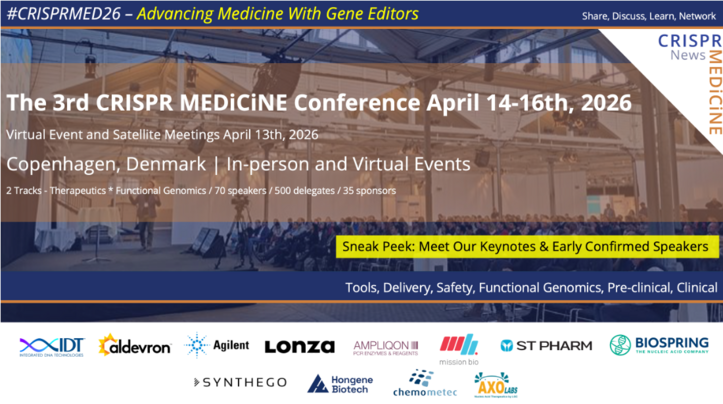CMN Weekly (3 November 2023) - Your Weekly CRISPR Medicine News
By: Karen O'Hanlon Cohrt - Nov. 3, 2023
Top picks
- Earlier this week, CRISPR Therapeutics announced completion of an FDA Advisory Committee Meeting for exagamglogene autotemcel (exa-cel) for severe sickle cell disease in people ages 12 and older with recurrent vaso-occlusive crises. A decision regarding FDA approval of exa-cel for sickle cell disease is expected early in December 2023.
- A play-by-play of the FDA’s meeting on Vertex, CRISPR’s sickle cell therapy. Expert advisers to the FDA have been reviewing CRISPR Therapeutics' and Vertex Pharmaceuticals' case for approval of what could be the first ever gene-editing therapy. You can follow that discussion in this recent writeup for BioPharma Dive.
Research
- In an article published this week in Cell Reports, researchers in the US report that CRISPR-mediated targeting of highly repetitive loci in the genomes of individuals with primary and recurrent gioblastoma (GBM) enables rapid elimination of GBM cells. The team refer to the new approach as "genome shredding", which leverages the non-coding genome and therapy-induced mutational signatures for targeted GBM cell depletion.
- Hyper IgM1 is an X-linked combined immunodeficiency that arises through CD40LG mutations, and is potentially treatable with CD4+ T-cell gene editing with Cas9 and a "one-size-fits-most" corrective template. Recognising the limited availability of data on the genomic alterations following long-range gene editing as well as a lack of consensus on the relevant assays, scientists in Italy and Spain developed drop-off digital PCR assays for unbiased detection of large on-target deletions and found them at high frequency upon editing. They found that large deletions were also common upon editing different loci and cell types and using alternative Cas9 and template delivery methods. Their findings were published yesterday in EMBO Journal.
- In an article published this week in Acta Biomaterialia, a team in China reports the development of a CRISPRa non-viral gene delivery platform by immobilising non-viral CRISPRa complexes into a biocompatible hydrogel/nanofiber (Gel/NF) composite scaffold. The team found that the scaffold allows for controlled and sustained release of CRISPRa complexes and promotes cell recruitment to the scaffold for efficient and localised transfection. As a proof of concept, they used the new CRISPRa delivery platform to activate the vascular endothelial growth factor (VEGF) gene in a rat model of full-thickness skin defects. Those experiments revealed sustained upregulation of VEGF expression even at 21 days post-implantation, resulting in enhanced angiogenesis and improved skin regeneration. The team proposes the Gel/NF scaffold-based CRISPRa delivery platform as an efficient and durable strategy for gene activation that offers promising prospects for tissue regeneration.
Industry
- Beam Therapeutics announced this week that it has made an agreement with Eli Lilly that will see Lilly acquire Beam’s opt-in rights to Verve Therapeutics’ base-editing programmes for cardiovascular disease. The agreement concerns Verve's programmes targeting PCSK9, ANGPTL3 and an undisclosed liver-mediated, cardiovascular target. Under the terms of the agreement, Beam will receive $250 million in a combined upfront payment and equity investment, which is expected to extend its cash runway to the second half of 2026.
- HuidaGene Therapeutics announced this week that the FDA has awarded Rare Pediatric Disease and Orphan Drug Designations to HG204, which is the world's first CRISPR RNA-editing therapy, for the treatment of MECP2 duplication syndrome.
- Cellectis is to present pre-clinical data on its multi-armored allogeneic MUC1-CAR T-cells targeting triple-negative breast cancer at the ongoing Society for Immunotherapy of Cancer (SITC) 38th Annual Meeting. The data will be presented in a poster entitled: TGF-Beta Blockade Combined with Activation-Induced IL12 Secretion Synergize to Optimize Potency of MUC1-CAR T-cells in Preclinical Targeting of Triple-Negative Breast Cancer.
- Cellectis also announced this week that it has entered strategic collaboration and investment agreements with AstraZeneca. Under the terms of the agreement, AstraZeneca will access Cellectis’ gene-editing technology and manufacturing capabilities to design novel cell- and gene therapy candidates. As part of the agreement, 25 genetic targets have been exclusively reserved for AstraZeneca, from which up to 10 candidate products could be explored for development. AstraZeneca will have an option for a worldwide exclusive license on the candidate products, to be exercised before IND filing.
- Iovance Biotherapeutics is set to present clinical and pre-clinical data for its tumour-infiltrating lymphocyte (TIL) therapies at the Society for Tumor Immunotherapy of Cancer’s (SITC) 38th Annual Meeting. The data will be shared in three poster presentations.
- Intellia Therapeutics presented new interim data from the ongoing Phase 1 trial of NTLA-2001 at the 4th International ATTR Amyloidosis Meeting. The latest data, collected from more than 60 patients, showed consistent, deep and durable serum TTR reduction achieved with a single dose of NTLA-2001, and that NTLA-2001 was generally well-tolerated across both polyneuropathy and cardiomyopathy arms at all dose levels tested. The company has selected a 55 mg dose of NTLA-2001 for further evaluation in the global pivotal Phase 3 trial expected to begin by year-end.
- Kite and Epic Bio have announced a collaboration to develop novel cell therapies for cancer. Specifically, the companies have entered into a research collaboration and license agreement using Epic Bio’s proprietary gene regulation platform to develop next-generation cancer cell therapies. The agreement will give Kite access to the licensed technology to modulate certain genes to potentially enhance CAR T-cell functionality.
Industry Quarter 3 2023 Updates
- Allogene Therapeutics has reported third quarter 2023 financial results and a business update. The report includes pipeline updates on the company's anti-CD19 AlloCAR T and anti-CD70 AlloCAR T programmes, updates on the company's technologies and new targets, as well as financial results and guidance for 2023.
- Sangamo Therapeutics announces strategic update and reports third quarter 2023 financial results. Among the updates the company shared progress on its transformation into a neurology-focused genomic medicine company, that it is deferring new investments in its ongoing Fabry and CAR-Treg programmes beyond what is currently committed, and that it is actively seeking collaboration partners or direct investors in both. In addition, Sangamo expects to close its Brisbane, California facility in early 2024 to save cash, and will transition its headquarters to its Richmond, California facility as of January 1, 2024. As a result, the company will cut its US workforce by approximately 40%.
Industry presentations at upcoming 65th Annual Meeting of the American Society of Hematology (ASH)
- Editas Medicine is scheduled to present clinical data from the ongoing RUBY And EdiTHAL clinical trials of EDIT-301 for sickle cell disease and beta thalassemia, respectively, at the ASH 2023 annual meeting and in a company-sponsored webinar. The presentations will include efficacy and safety data from patients enroled in the ongoing trials.
- Poseida Therapeutics announced that it will present three posters at the ASH Annual Meeting. These will include early safety data for P-BCMA-ALLO1, a fully allogeneic CAR-T candidate, in patients with relapsed or refractory multiple myeloma as well as updates from the company's gene therapy programme for haemophilia A.
- Allogene Therapeutics has announced two poster presentations focused on the importance of lymphodepletion in allogeneic cell therapy. The first poster will provide a detailed safety review of all 85 patients treated in the Phase 1 ALPHA and ALPHA2 trials in relapsed or refractory large B cell lymphoma and follicular lymphoma to characterise the overall safety profile when ALLO-647 is added to standard lymphodepletion. The second poster will reveal translational results from the ALPHA2 trial generated through a collaboration with researchers from The University of Texas MD Anderson Cancer Center. This study compared expansion kinetics among 11 allogeneic CAR T recipients treated with investigational ALLO-501A in the ALPHA2 trial.
- Vertex Pharmaceuticals, which is co-developing exa-cel with CRISPR Therapeutics, is scheduled to present new data on exa-cel at the ASH Annual Meeting. The data will be shared in two presentations describing additional patients with longer follow-up duration from pivotal Phase 3 trials investigating exa-cel's potential as a one-time functional cure for sickle cell disease and transfusion-dependent beta thalassemia.
- Cellectis will present preliminary results of NATHALI_01 and updated results of the BALLI_01 Phase I trials at the ASH Annual meeting. The BALLI-01 trial is evaluating the TALEN-engineered CD-22 targeting cell therapy candidate UCART22 in acute lymphoblastic leukaemia.
- Vor Biopharma has announced multiple clinical and pre-clinical presentations at ASH 2023, highlighting its novel eHSC and CAR-T platform. The updates will be delivered in three oral and two poster presentations, and will include pre-clinical and clinical data supporting the company's novel approach to treating acute myeloid leukemia.
Reviews
- Expanded Alternatives of CRISPR-Cas9 Applications in Immunotherapy of Colorectal Cancer. Immunotherapies exist for colorectal cancer (CRC), but their use is limited to patients with advanced disease that exhibits microsatellite instability, and who have already received standard first-line chemotherapy. In a new article published in Molecular Diagnosis & Therapy, researchers based at Universidad Nacional Autónoma de México provide a comprehensive review of the potential of CRISPR technology to improve the immunotherapy landscape for solid tumours including CRC.
- Dystrophin- and Utrophin-Based Therapeutic Approaches for Treatment of Duchenne Muscular Dystrophy: A Comparative Review. Researchers in Poland and US compare dystrophin and utrophin amino acid sequences and structures, combining published data with their own extended in silico analyses, and discuss their findings in the context of therapeutic approaches for Duchenne muscular dystrophy (DMD). According to them, their findings highlight the importance of various dystrophin and utrophin domains in DMD treatment, and provide insights into designing novel therapeutic compounds with improved efficacy and decreased immunoreactivity.
News from CRISPR Medicine News
- On Wednesday, we published a clinical update about an ongoing trial for HIV. Excision BioTherapeutics reported positive interim clinical data for its HIV therapeutic candidate EBT-101 at this year's European Society for Gene & Cell Therapy annual meeting, which was held in Brussels last week. Read our update here.
To get more CRISPR Medicine News delivered to your inbox, sign up to the free weekly CMN Newsletter here.
Tags
CLINICAL TRIALS
IND Enabling
Phase I
Phase II
Phase III
Recurrent or Progressive High-grade Glioma, (NCT06737146)
Sponsors:
Suzhou Maximum Bio-tech Co., Ltd.
Sponsors:
Suzhou Maximum Bio-tech Co., Ltd.
IND Enabling
Phase I
Phase II
Phase III
Advanced Peritoneal Malignancies or Abdominal Metastatic Solid Tumors, (NCT06912152)
Sponsors:
Zhejiang University
Sponsors:
Zhejiang University
IND Enabling
Phase I
Phase II
Phase III







